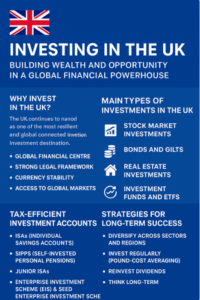
Investing in the UK: Building Wealth and Opportunity in a Global Financial Powerhouse
Investing was no longer the exclusive purview of the wealthy, it quickly emerged as a basic tool for securing long-term stability and financial independence and buying into a piece of one of the world’s most dynamic economies.
The United Kingdom continues to be an international centre for investors with a rich financial ecosystem of tradition, innovation and transparency. If you’re an expat looking for secure investments, a first-time UK property investor or even a continuing business owner searching to grow your personal portfolio, learning how to spend money on home in the united kingdom can open doors up from then there.
The guide looks at the basics of investing in the UK — from how markets work and tax-efficient accounts to which are the best platforms and long-term strategies for building wealth.

🇬🇧 Why Invest in the UK?
The UK remains one of the most resilient and internationally connected investment destinations. Even in the face of recent economic head winds — from inflationary pressures to political transitions — its regulatory framework, financial stability and robust legal protections make it a trusted space for both local and foreign investors.
The Greatness of the UK Investment Market:
- Global Financial Centre: London continues to be one of the world’s leading financial centres for finance, fintech and innovation.
- Well-Defined Legal System: Clear property and contract rights protect investors.
- Currency Strength The British Pound (GBP) is also a widely traded currency.
- Access to Global Markets: The UK enables direct access to European, USA & Asian investors.
💹 Key Investment Types in the UK
1. Stock Market Investments
The London Stock Exchange (LSE) is home to some of the most established firms in the world — from energy behemoths BP and Shell, to fintech forerunners Revolut and Wise.
Investing in the UK markets does mean investing globally from a local perspective. Look at a diversified, large-cap, mid-cap and dividend paying stock portfolio.
2. Bonds and Gilts
UK government bonds (gilts) and corporate bonds provide fixed, lower risk returns. They are perfect for investors who want steady income and to protect their capital — especially during periods of market turmoil.
3. Real Estate Investments
Property remains a British favourite. Real estate investment in the UK — whether it’s in buy-to-let properties, commercial real estate or via REITs (Real Estate Investment Trusts) — remains a viable option for high yield investments, especially so in cities such as Manchester, Birmingham and London.
4. Investment Funds and ETFs
Platforms like Vanguard, Hargreaves Lansdown, AJ Bell and Fidelity have made it simpler than ever to invest in mutual funds and ETFs. These vehicles enable investors to access a diversified range of assets at relatively low costs and diversify risk.
5. Alternative Investments
As well as traditional stocks and bonds, the UK market is witnessing greater involvement in sustainable investing, private equity, green energy funds and even digital assets (subject to FCA guidelines).
💷 Tax-Efficient Investment Accounts
Understanding tax-efficient wrappers is crucial for ensuring you’re getting the most out of your investment.
- ISAs (Individual Savings Accounts):
Put in £20,000 a year tax-free. Those options include Cash ISAs, Stocks & Shares ISAs and Lifetime ISAs.
- SIPPs (Self-Invested Personal Pensions):
Good for those wanting more control over their retirement savings, plus tax relief on contributions.
- Junior ISAs:
Great for parents who are interested in their kid’s future.
- Enterprise Investment Scheme (EIS) & Seed Enterprise Investment Scheme (SEIS) related:
Made for high-growth scale-up ventures, providing generous tax reliefs to investors backing riskier businesses.
📈 Strategies for Long-Term Success
- Diversify Across Sectors and Regions
Diversify your portfolio across stocks, bonds, real estate and other asset classes.
2. Invest Regularly (Pound-Cost Averaging)
By contributing a set amount each month, you mitigate market volatility and emotions.
3. Reinvest Dividends
Compounded dividends really can make your returns soar over time.
4. Think Long-Term
Short-term volatility is inevitable. Think about your 5-, 10- and even 20-year aims, not the day-to-day noise of markets.
5. Stay Informed
You can also get market knowledge from reliable financial news providers such as the Financial Times, Bloomberg UK, and the Bank of England.
🧠 When to Get Professional Help
Though lots of UK investment platforms can easily facilitate a do-it-yourself portfolio, the services of an FCA-regulated financial adviser can be invaluable — particularly for tricky terrain such as:
- Estate and inheritance tax planning
- Portfolio diversification across currencies
- Retirement and pension investment strategies
- Navigating post-Brexit market shifts
Conservative and regulated advice guarantees you make the decisions that fit your circumstances, time frame, and risk tolerance.
⚙️ Tools and Platforms for UK Investors
MoneyHelper – Government-backed financial guidance (moneyhelper.org.uk)
AJ Bell / Hargreaves Lansdown / Freetrade / Interactive Investor – Accessible investment platforms
Bank of England & HMRC – Key updates on economic outlook and tax policies
Morningstar UK – Comprehensive investment research and fund ratings
🎯 Final Thoughts
Investing in the UK offers both stability and innovation — a combination few markets can match. From traditional blue-chip companies to emerging green technologies and fintech disruptors, the opportunities are endless for those willing to plan wisely and think long-term.
Remember, investing isn’t about predicting the future — it’s about preparing for it. With the right strategy, mindset, and awareness of the UK’s unique financial environment, your investments can become the foundation of true financial freedom.
Our Post


The Resilient Pound: Navigating the UK’s New Economic Landscape


